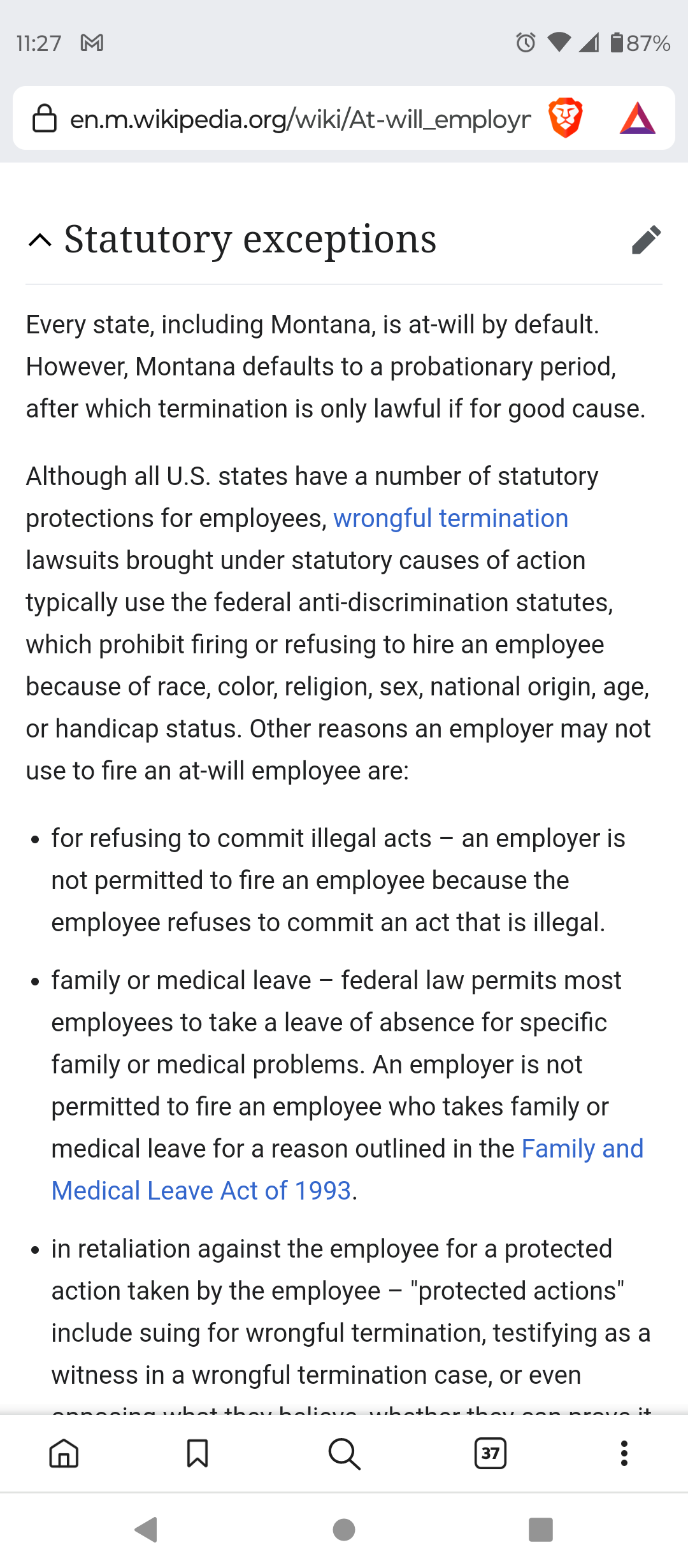Morale at work has been super low for the past few years, ever since the CEO/President bragged about how well they did in 2021 “record profits, over and beyond anything we ever expected” and 2022 “we barely made more than we did last year”, but none of that success trickled down to the people responsible for that success. I’m surrounded by people actively looking for work elsewhere. So, to keep people from quitting, the company forced everyone to sign the agreement in the Imgur link I’ve attached. Of course it gives all power to the company, and of course we had to sign it under penalty of losing our jobs immediately.
This of course is in addition to Top Management blaming the Bottom Management for the morale issue, and rebranding poor morale as an “engagement issue”. They’re also forcing the workers to come up with solutions for the “engagement issue”, going so far as to put it on our annual reviews. Part of our “goals for the upcoming year” is to deal with “low engagement”. That’s right, if we don’t come up with solutions for our own morale problem, it will look poorly on our reviews.
I have worked for some brain-dead companies before, but I’ve never seen such myopia in Leadership. At least previously I knew I was getting fucked on purpose. Right now I’m not sure if it’s an accident.
Due to being overbroad, these kinds of boilerplate agreements are largely unenforceable of challenged.
However most folks can’t afford the lawyer.
It’s not even necessary to challenge it. You quit, go work for a competitor, they send you an angry lawyers letter threatening you, you ignore it and the company backs down. Unless you are legitimately stealing their customers, it’s not even worth the cost of filing a lawsuit for an employer to go after an employee for violating a non-compete, so they just stop at the angry lawyers letter.
Most are not in a position to afford such a risk. Council may be able to give advice aligned with your suggestion, but access remains a barrier.
Liberal systems are framed as giving freedom to everyone, but in fact they simply support the preexisting conditions of social stratification and marginalization. Unfortunately, unless workers support each other directly, the few will remain powerful and many more will remain disenfranchised.
deleted by creator
These are “non-enforcable” in some states.
Removed by mod
deleted by creator
And that is how I got most of a year of full pay and insurance. I saved my unemployment benefit to start toward the end of the time and took a few months off to hang out with my kids.
I was typing up a long reply basically saying this, but you summed it up. In most cases, it’s pure nonsense. Unless you’re actively sharing legitimate trade secrets that you were especially privy to, which could reasonably tank the company’s position or competitive advantage based on your actions, it’s trash talk. Change roles to your biggest competitor and tell your CEO/president to eat a side of juicy cockroaches alongside their breakfast of profits while your new employer values your particularly meaningful “suggestions”.
I don’t see how this is legal in any way to force you to sign an agreement like that. I’d be searching for a new job the second a company even consideres forcing me to sign. Also, I’d probably be petty enough to “accidentally” leak classified information that multiple others know of on some forum on TOR just to spite this kind of behavior.
IANAL but wouldn’t making employees sign this after they are hired and have been working for the company be seen as coercion or signing under duress (threatened about losing your income if you don’t sign) and make it null and void if challenged later?
Probably not. Employers can fire employees at any time for any reason at all.
I don’t doubt they could be fired for not signing, I’m saying that even if they do sign they probably don’t have to obey the contract since it was signed under duress. Then they can sign to keep their job, quit once they find another job and not worry about the non-compete.
I’m saying the “under duress” part doesn’t apply. Your employer could tell you “wear a red shirt tomorrow or you’re fired”. And then, if you wear a red shirt, still fire you. All legal and all perfectly normal in the usa
That definitely seems like a case where a consultation with an employment lawyer is necessary. The non-compete is super broad and vaguely defined making it potentially unenforcable. They didn’t even define what a “reasonable amount of time” is. It could just be 1-2 months. And if you were forced to sign it then and there or lose your job, that opens up even more possibilities to have this thrown out.
But local laws on non-competes vary a lot making any advice from the internet pointless. You might also have to take some actions rather soon after signing it or it will stick. So spending $200 on a short consultation could pay off in the long run. If you shop around for a bit you might even find a free consultation.
In several countries they are outright illegal unless the person is paid for the non-compete period.
In the US, however…
From what I’ve read and been presented as long as you can prove they stop you from being gainfully employed they are barely worth the paper printed on. I could be very wrong though.
In any " At Will" state. A few states might have some ridiculous shit going on.
California for the most part considers these illegal agreements.
That’s a very different and far less employee friendly situation.
In your case an ex-employee can still be stopped from taking certain better paying jobs (because he or she can still find what the Law deems as “gainful employment” even if paying less) all the while the ex-employer pays nothing for limiting the freedom of that person, plus the onus of proof if fighting the non-compete is on the ex-employee, not on the ex-employer.
Meanwhile in those other countries the ex-employee has to pay the ex-employer for the non-compete (and if it’s taken to court prove that they were paying for it) or the non-compete simply gets thrown out by the court, with no need for the ex-employer to prove anything.
Your is not a good and fair situation because an entity can still leverage its position of power to obtain benefits (quite possibly very significant ones) from a person after the period of a contract is over without having to pay for it, it’s simply not as extremelly bad as becoming unable to feed yourself (by not being able to find “gainful employment”). Sure you’re not completelly totally fucked, just very fucked.
That’s not at all comparable with the situation were by law they have to pay an ex-employee for it and it has to be set in stone contractually from the start (i.e. if they don’t used it it’s their problem) - in your case the ex-employee starts from having his or her post-employement choices limited at no cost for the ex-employer and having to dig his or her way out of it whilst in less shitty countries the ex-employer has to have a proper contract with actual monetary compensation to obtain that benefit of an ex-employee refraining from taking certain jobs, even it ends up being useless.
I’m actually shocked so many people seem to think what you described is a good thing, when it’s clearly a “the employee is still fucked at no cost for an employer, just not so totally fucked they end up homeless and starving to death”.
Where are you getting all this. The employee doesn’t have to do anything. The employer would have to sue them for breach, at the employers cost. You present it like a no cost to the employer thing. Of course never sign one of these anyway. They can’t fire you instantly for it. Tell them your lawyer will read it and you will get back to them. Should buy you a week or two to look for a new job.
The no cost for the employer thing is because the employee will likely refrain from taking certain offers after they leave, because they’re concerned about the costs of being sued and the possibility of losing the case because they could have found “gainful employment” (just not that specific offer) - as you described, it seems to imply that the ex-employee, having signed a non-compete does legally have to refrain from taking certain job offers unless they literally have no other choice.
The mere risk of being sued and losing the case leads the ex-employer to refrain from taking certain jobs, providing the ex-employee with benefits (such as denying certain expert resources to competing companies) at no cost.
When the law is crystal clear that non-competes are only valid if paid for, there is no such threat hanging over the ex-employee (as not only would the ex-employer see its case summary thrown out if they took it to court, they would actually pay all the legal costs of the ex-employee) hence the ex-employee has zero pressure in their choice of future employeers.
It’s the difference between a non-compete being a genuine risk for an ex-employee if broken versus being no risk whatsoever (literally worth less than the paper its written on).
That said I totally agree that when one is in a position to do so (which by now I personally am), just refuse to sign the non-compete. This is however rarelly the case for the more junior types or when the market is bad (such as my case below which happenned just after the first Tech crash).
(Mind you, I was once pushed to sign one with an “or else we will withdraw our job offer” threat - just after the first Tech crash in 2000, so I would be hard pressed to find anything else before running out of savings if I didn’t took that job - and I pretty much started looking for another job from day 1 there, without them even having an hint of that was going on, taking my time and being chosy, and 11 months later, after having become pretty essential to the team, I had something much better and just dumped them with the explanation that “You chose to make it an adversarial relationship from the start, so I’m leaving now that I have the kind of offer I prefer and don’t really care about what my leaving with the minimum notice will do to your projects”. Funny enough I later found that in that country non-competes were worthless if not paid, so all that shit they pulled was useless and created a situation which was ultimatelly a net loss for them).
In the previous multinational where I worked, the US lawyer made it clear that non compete clauses are typically unenforceable and should be removed because they tend to piss people off.
Now YMMV, but from that, I always took that these clauses are one of those “we’ll add it even though it’s completely unenforceable and illegal but it’s there anyway to scare you into submission” things
Referred to as restraint of trade clauses where I am, and they aren’t enforceable under most circumstances. Any other job where I’m able to apply my specific experience could be considered a direct competitor, doesn’t matter. Similar clause was in my amended contract a few years back, I raised it with my boss and he told me not to worry about it for that reason. I said just remove it then if there’s no reason for it and they did.
As others said you may need a lawyer to look over it which can be expensive, however, since many employees are affected, you can pool your resources together and split the lawyer fees.
As it is, point 2 from this page seems relevant:
https://www.maxwellgoss.com/post/beat-your-non-compete-five-ways-out-of-a-non-compete-agreement
Your non-compete may include language stating that its purpose is to protect confidential information. But if the employer never gave you access to such information—or if the information it gave you is known to the public and thus not actually confidential—then the agreement may not protect a reasonable business interest. Similarly, if the non-compete claims to protect customer relationships, but you were not working in a customer-facing role, it may be that no legitimate interest is being protected
Italian here. This kind of non compete agreement are legal here as long as the employee gets compensated with a raise high enough to justify the terms. So a judge may rule in favor of the employee if the contract is too strict or if the pay raise was not high enough.
It seems fair enough doing that way.
Dutch here, I always ignore shit like this, they are for all intends and purposes non enforceable. except when you’re high enough up in the management tree. Then it can get tricky.
Love all of the folks saying these are unenforceable with confidence.
A non-compete cost me a job offer once. Some states have “selective enforcement” as a defense against suits from corporations towards persons. In short: this means that a company may weaken their ability to enforce the non-compete if they don’t pursue litigation against you for violating their non-compete. Even going to litigation or arbitration against a corporation could bankrupt a white-collar citizen before getting a verdict on such a case.
I recommend trying and put off signing the agreement as long as you can and look for new opportunities if you can (feign ignorance if ya have to). I wish I would have delayed signing, as I probably could have bought myself 6 months with how sloppy the company was run.
From the wording it looks like OP already has signed the thing.
I never understood these. They make you sign these non-competes as part of a contract agreement.
If you quit or they fire you, guess what… no more contract! Therefore, any agreements in it are poof, gone.
Or so it should be.
I had an employer at one time that tried these contracts and tried to go after anyone that took a job anywhere in the same field of work. When I say this, I don’t mean like direct competitors, it was more like if you took a job in tech, that was close enough.
It was a miserable company and I’m glad I no longer work there.
They aren’t legitimate and the fact that the state considers them such is why the state itself is illegitimate, among other reasons.
Big 3, Op?






